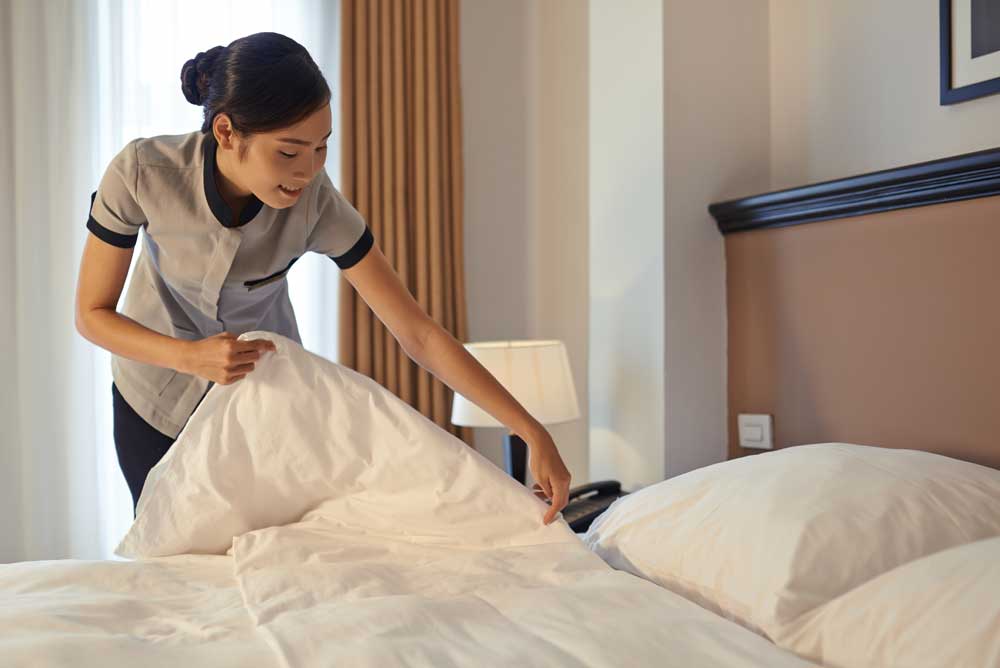Disclaimer: The information on our website is provided for general information purposes only. We make no representations or warranties of any kind, express or implied, about the completeness, accuracy, reliability, suitability or availability with respect to the website or the information contained on our website for any purpose. Any reliance on such information is therefore strictly at your own risk and we are not liable for any damages or losses arising out of or resulting from your reliance on any information contained on our website.
A housekeeper is employed in a variety of places such as hotels, private households, hospitals, or other establishments that need multiple tasks of light cleaning. Additionally, they may work at multiple locations for various clients in a given day or work at one location. Those in this career are also sometimes called housecleaners, maids, room attendants, housekeeping aides, housekeeping laundry workers, or room cleaners. Next, watch a video to learn what a housekeeper (clearer) does.
How to Become a Housekeeper

A housekeeper may be asked to have a high school diploma or the equivalent to get a job, however it is not always necessary. An employer may expect you to have work related experience such as a history and good referencing cleaning at other businesses and want someone who effectively works with people well. They may also ask how long cleaning a particular space may take you. This can also be a part-time job for someone who needs extra work or an option for a student who has yet to graduate high school as they may be able to get a position on the weekends working with an experienced housekeeper.
If you are a new housekeeper, you may work under a more experienced person from a few months to one year. A housekeeper must be physically able to do the work as you will often bend, stretch to reach items and hard to get to locations, and need stamina to stand on your feet for long hours. Having good core strength is also helpful as you may need to lift or move heavy objects. Employers like housekeepers that are detail-oriented, thorough, dependable, and timely.
Job Description of a Housekeeper
A housekeeper cleans spaces and must complete tasks such as vacuuming, emptying the trash, dusting, sweeping, mopping floors, doing dishes, and a variety of other tasks. They may be required to use disinfectants or use steam operated sterilizers. If working in a healthcare setting, they would also meet any sanitation standards that are in place. This is a very physical career as housekeepers may be required to move furniture or equipment in order to clean well. Along with moving equipment, they may also need to carry items such as linens, towels, cleaning supplies, and trash.
Depending where they work, they may also need to change any used bed linens and replace them with clean bedding. In the bathroom, they would be responsible to remove any used towels and replace those with clean towels as well. Some private households ask for additional duties, such as washing dishes, doing light ironing, or even laundry. Additionally, housekeepers would report any safety hazards to their employer.
Free Teacher and Student Resources
Teachers, the U.S. Environmental Protection Agency (or EPA) offers a free Teacher’s Classroom Checklist. Additionally, you can print this to ensure your classroom is ready for students. The EPA also has free Lesson Plans, Teacher Guides and Online Environmental Resources for Educators.
Housekeeper Career Video Transcript
Maids and housekeeping cleaners keep things sparkling and sanitary, whether they work in a hotel, hospital, business, or home. While specific duties can vary greatly depending on the establishment, cleaners take responsibility for a space after others are done using it, or while they’re away, and return it to the state it needs to be in for guests, patients, and residents to be comfortable. Maids and housekeeping cleaners maintain many facilities in daily use: they make beds, replace linens, empty wastebaskets, wash dishes, and replenish supplies. When conditions are more seriously out of order, they may also order repairs and perform more in-depth cleaning such as shampooing carpets. They also report damage and thefts, and may supervise other workers.
At hotels and hospitals, housekeeping cleaners often have responsibilities for a specific section of the facility, with duties such as keeping linens stocked and ordering supplies… whereas maids working in private households are more likely to perform errands or clean up by vacuuming, dusting and putting items away. Maids and housekeepers’ hours vary, ranging from full time, part time, to seasonal work schedules. Companies that contract out cleaning services may offer a variety of schedules and work environments. Maids and housekeeping cleaners do not usually require any formal education, although many have completed a high school diploma or equivalent.
Article Citations
Bureau of Labor Statistics, U.S. Department of Labor, Occupational Outlook Handbook, Maids and Housekeeping Cleaners.
National Center for O*NET Development. 37-2012.00. O*NET OnLine. This page includes information from O*NET OnLine by the U.S. Department of Labor, Employment and Training Administration (USDOL/ETA). Used under the CC BY 4.0 license. O*NET® is a trademark of USDOL/ETA. RethinkOldSchool, Inc. has modified all or some of this information. USDOL/ETA has not approved, endorsed, or tested these modifications.
The career video is in the public domain from the U. S. Department of Labor, Employment and Training Administration.

